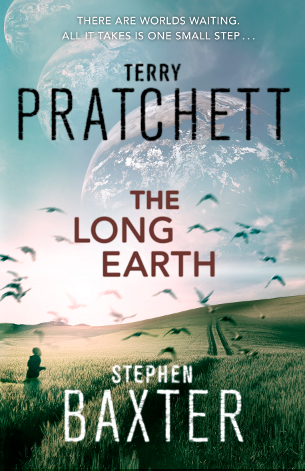Why you can trust GamesRadar+
What happens when you combine one of the finest fantasy authors the UK has ever produced and a renowned hard SF writer with a flair for the epic? As literary alchemy goes it’s a tantalising prospect, especially when the two titans involved are Terry Pratchett – knight of the realm, creator of the Discworld, bacon butty enthusiast – and Stephen Baxter, a man in possession of a mind so sharp he’s in danger of piercing the very fabric of reality itself.
The answer is, of course, The Long Earth . It centres around a premise that’s simple enough, albeit in a quantum-y kind of a way: what if our Earth was one of a chain of Earths, each existing in parallel universes, which stretched out either side of our world in a seemingly endless string of planets?
In the hands of Pratchett and Baxter, the possibilities are almost infinite. The story begins with Private Percy, a World War One Tommy who accidentally “steps” from our Earth – henceforth known as the Datum – to one of our neighbouring worlds, a planet identical to home except for the complete lack of humanity and any sign of civilisation. Years later, a scientist named Willis Linsay invents the stepper, a potato-powered device that allows anyone to jump ship and head off into the Long Earth, kick-starting a seismic shift in humanity’s relationship with Mother Earth.
Enter introvert Joshua Valienté, who can hop away from the Datum naturally, without the aid of any device. He’s spent most of his life exploring the Long Earth, becoming something of a legend in the process, and his unusual abilities lead to his recruitment by transEarth, a corporation set on exploring the Long Earth phenomenon. There he teams up with Lobsang, a superbrained human/AI hybrid with a high-tech aluminium airship, and the two of them go searching for answers hundreds of thousands of Earths away from the Datum.
A far cry from the comic fantasies that made Pratchett a household name, The Long Earth reveals its intentions slowly, the possibilities of the endless Earths gradually becoming apparent. The central plot is wide-eyed exploratory SF in the American tradition, interspersed with stories of individuals and families whose lives are radically transformed by the prospect of a new life on an Earth far away.
It’s a story that revels in big ideas. Unshackling humanity from its dependence on finite resources – oil, gold, land – has far-reaching consequences, both on the Datum and further abroad. Governments face a bewildering array of challenges, from sovereignty issues to law enforcement in a world where anyone can “step” into high-security buildings. It also poses big questions: why have humans only evolved on our Earth? Are there other creatures out there? Where does the Long Earth end? What have potatoes got to do with anything? You can sense the excitement of the authors as they toy with the labyrinthine possibilities of their premise, and it’s infectious.
As a co-write, things go pretty smoothly. You can detect Pratchett’s fingerprints in various gags and character quirks, just as you can sense Baxter’s imagination at play as Lobsang and Joshua encounter strange new worlds together. It’s an intoxicating combination, infusing proceedings with a great sense of purpose.
The ending feels a little truncated, but as befits a book which asks more questions than it answers, there’s plenty more to come. The canvas of the Long Earth is so vast, so full of storytelling potential, that it would be a crime not to explore further, and thankfully that’s exactly what Pratchett and Baxter intend to do. It’s a good job, as The Long Earth is by turns thrillingly expansive, joyously inventive and utterly engrossing.
Rob Power
Read more of our book reviews .



